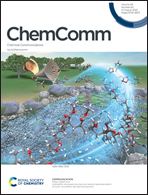Hydrophilic bio-based polymers by radical copolymerization of cyclic vinyl ethers derived from glycerol†
Abstract
In this study, novel functional polymers were obtained by using glycerol as a bio-based precursor, which is abundant and inexpensive renewable feedstock with a polyol skeleton. Cyclic vinyl ethers with acetal linkage were derived from glycerol to yield well-defined copolymers by reversible addition-fragmentation chain transfer (RAFT) radical copolymerization with common vinyl monomers. The resulting acetal-containing copolymers could be hydrolyzed under acidic conditions to afford water-soluble functional polymers with pendent diols.



 Please wait while we load your content...
Please wait while we load your content...